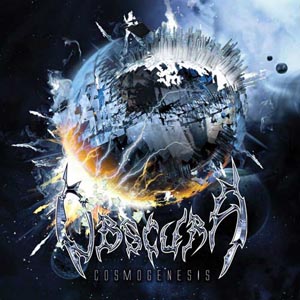
“Progressive” death metal is probably the most difficult death metal subgenre to do anything interesting in, because for the most part it is mainstream metal given the spin with dynamic production, aesthetic variation and all kinds of pointless superimposed elements, giving only rehashes of the popular substyles of death metal. It does not come as a surprise that on the new album Cosmogenesis, Obscura blends very well into the bland mainstream oriented current of Gothenburg (esp. Dark Tranquillity) and tech-death (esp. Atheist) influences. While apparently taking their name from a perennial Gorguts favorite, this neo-progressive metal opera only hints at the beautiful quasi-random soulseeking of Alf Svensson’s space-themed Oxiplegatz project and fails to unite all the various tendencies and instrumental parts into a descriptive work: the acoustic guitars, the Cynic-esque clean vocals, the fusion guitar heroics and even the modern grindcore reminiscent of Nile comes and goes at will but fails to instate lasting effect because the structure is uninvolving. Who anyway thought that it’s a good idea to combine Cynic’s “Focus” with metalcore standards and “catchy” lead guitar? It’s the most anal “heavy” music in 2009 but, hey, it will get 10000% in Metal-Archives because the majority are suckers for this! I like to think that these guys are very good jazz musicians but for metal, sorry, unable to capture the intensity and genius of the originators of the death metal genre.

Resembling a ten times more cheesy Nocturnus, Kalisia utilizes mainstream metal production values to hybridize progressive space metal with Arch Enemy school death/thrash. It contains some astonishingly bad sequences, like those belonging to vapid jazz musicians attempting death metal, especially when the solos scream conservatory trained pop musician virtuoso. Think of the latest Cynic album and make it more commercial and add booming synths and easy listening female vocals. In a weaker approximation of the massive sagas of Oxiplegatz and Bal-Sagoth, Kalisia goes for pure theatre of the macabre, a narrative science fiction tale of soundtrack cliches, processed voices and ADHD mix of influences as if doing something new, but wimpy and non-challenging. Death metal can lend itself beautifully to science fiction operas (think of Nocturnus or SUP) but it works only when suggestive use of texture can build an alien landscape – this kind of shrill, digital and annoying pop-influenced soundscape is closer to Nightwish than real death metal. The wanking and the various processes make Kalisia sound flashy and hysterical, rooted in a human personality. It has too much safe music for people who do not dare to truly break out and dream of the Otherworld. The professional musicianship may satisfy a fan of mainstream metal, but there’s very little sparkling innovation, unique spirit or brutal force to make an underground metal fan’s passion ignite.
-Devamitra-
No CommentsTags: death metal, Gothenburg Death Metal, Heavy Metal, Kalisia, Melodic Death Metal, Obscura



